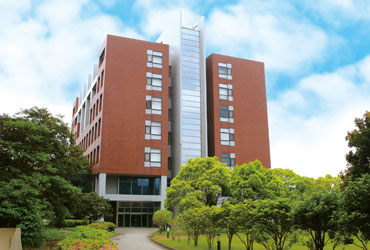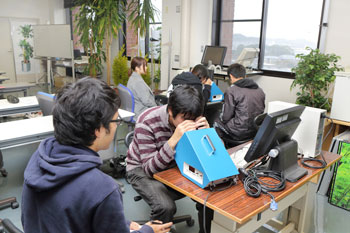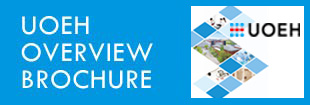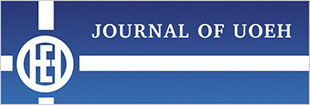Department of Nursing Annual Enrollment 70 / Period of Attendance 4 years
Department
of
Occupational
Hygiene
Annual
Enrollment
20
/ Period
of
Attendance
4
years

◆
Educational
Purposes
In
order
to
be
a
good
partner
with
occupational
health
physicians,
staff
members
in
occupational
and
environmental
health
activities
are
required
to
have
two
important
qualities:
“creative
intelligence”
and
“attitude
of
responsibility
for
one’s
own
learning.”
To
meet
the
changing
social
needs,
the
School
of
Health
Sciences
develops
human
resources
which
can
contribute
to
occupational
health
in
an
integral
and
creative
manner,
with
a
perspective
on
the
relationship
between
life
systems
and
environments.
|
◆ Academic Departments 講座等 |
|||
|
Department of
Nursing |
Human,Information and Life Sciences | 人間情報科学 | |
| Nursing Science and Arts | 基礎看護学 | ||
| Clinical Nursing | 成人・老年看護学 | ||
| Nursing of Human Broad Development | 広域・発達看護学 | ||
| Occupational and Community Health Nursing | 産業・地域看護学 | ||
|
Department
of
Occupational
Hygiene |
Environmental Measurement and Control | 作業環境計測制御学 | |
| Occupational Safety and Health Management | 安全衛生マネジメント学 | ||
Departmentof Nursing
・Annual Enrollment 70・Period of Attendance 4 years

The educational Department of Nursing gives students the underlying knowledge, skills and attitude to be a nursing professional, with recognition of the role in industrial nursing, and with the flexibility to meet social changes and technological developments.
◆ Diploma Policy
The Department of Nursing, Faculty of Health Sciences, the University of Occupational and Environmental Health, Japan, confers a graduation certificate in Nursing Science on students who have: 1) understood the objectives and mission of the university, which “conducts educational research related to medical science, nursing science and other healthcare sciences, contributes to the promotion of these sciences that are relevant to the working environment and workers’ health, and develops medical professionals in these fields”; 2) acquired the knowledge, skills and attitude that are essential to a nursing specialist in the course terms or longer, as prescribed by the university; 3) completed the number of credits required for graduation and received the course completion certificate; and 4) acquired the qualities and abilities explained below.
| 1 |
Human
Nature
and
Ethics Students will have acquired a rich sense of human nature and will maintain a high ethical standard to respect the dignity of life and defend people’s rights, and will be able to explore the true nature of things. |
| 2 |
Nursing
Knowledge
and
Skills Students will have acquired knowledge and skills to identify people’s health problems in various fields and will be able to give them adequate nursing care based on scientific principles. |
| 3 |
Nursing Ability, Critical Thinking, and Problem-Solving Ability Students will be able to provide patients with nursing in a creative way, anticipating social changes, and will be able to improve the quality of nursing care. |
| 4 |
Occupational
Nursing
and
Communication
Skills Students will be able to consider people’s health from the various perspectives of their working environments, and will be able to coordinate solutions to problems in collaboration with various types of professionals. |
| 5 |
International
Contributions
and
Personal
Development Students will have gained the mentality to recognize people’s health from a global perspective, and will be able to keep developing themselves as independent nursing specialists. |
◆ Curriculum Policy(Curriculum Organization and its Implementation Policy)
The Department of Nursing, Faculty of Occupational Health Sciences, fosters nurses who can contribute to the development of creative nursing science and to the local and international community, with practical nursing skills based on logical and ethical considerations from an interdisciplinary perspective. We also nurture excellent industrial nurses who contribute to the maintenance and promotion of occupational health.
In order to achieve these goals, the following educational curricula will be organized and implemented. In addition, we promote self-directed learning through our active learning system.
| 1 |
Basic Liberal Arts The program consists of humanities & social science courses to enhance students' resourcefulness and multifaceted perspective; language courses to form internationally-minded students; and natural science courses. These courses are mainly offered in the first year. |
| 2 |
Basic Nursing The program consists of information science, life/health support, and pathophysiology/therapeutics, and is taken from the first year to the first semester of the third year. The purpose of the Basic Nursing program is to help students acquire the knowledge, skills, and attitudes that form the foundation of practical nursing skills based on a physical, mental, and social understanding of the human body. |
| 3 |
Nursing Specialty The program consists of basic nursing, clinical nursing, home health nursing, and public health nursing. The purpose of the Nursing Speciality program is to help students acquire the practical nursing skills required to deal with a variety of health issues. Through these courses, students will acquire the knowledge, skills, and attitudes necessary for practicing nurses, as well as developing their critical thinking and decision-making skills. These courses are offered from the first year to the first semester of the third year. |
| 4 |
Integrated Nursing
The
program
consists
of
first-year
education,
risk
management,
and
nursing |
| 5 |
Health Science Specialty The program consists of courses related to public health nurse education which provide a foundation for students to acquire the practical skills required of public health nurses. It also includes courses related to occupational nursing that aim to train occupational health nurses who will be active in a workplace environment, a distinctive feature of this university. These courses are offered from the third year to the first semester of the fourth year. |
| 6 |
Judgment of Academic Achievement The results of the above (1-5) will be evaluated individually and continuously according to the student's growth, using portfolios, rubrics, OSCEs, individual case study evaluations, and academic behavior surveys. |
◆
Graduate
Careers
Graduates of Nursing are expected to play an active role in hospitals and companies by making use of the following licenses and qualifications.
● Clinical Nurse License
● Public
Health
Nurse
License
(Those
with
this
license
can
also
acquire
the
following
licenses/qualifications.)
・Class-2
Nursing
Teacher
・Class-1
Health
Supervisor
Department of Occupational Hygiene
・Annual Enrollment 20 ・Period of Attendance 4 years
 Department
of
Occupational
Hygiene
gives
students
the
specialized
knowledge
that
is
required
to
maintain
workers’
health
and
create
a
safe
and
comfortable
working
environment,
by
improving
the
basic
academic
abilities
that
the
students
learned
in
high
school.
At
the
same
time,
it
provides
students
with
science-based
skills
and
technological
skills
to
assess
and
improve
the
working
environment,
and
trains
professionals
who
can
maintain
workers’
health
and
create
safe
and
comfortable
environments
from
an
engineering
perspective.
Department
of
Occupational
Hygiene
gives
students
the
specialized
knowledge
that
is
required
to
maintain
workers’
health
and
create
a
safe
and
comfortable
working
environment,
by
improving
the
basic
academic
abilities
that
the
students
learned
in
high
school.
At
the
same
time,
it
provides
students
with
science-based
skills
and
technological
skills
to
assess
and
improve
the
working
environment,
and
trains
professionals
who
can
maintain
workers’
health
and
create
safe
and
comfortable
environments
from
an
engineering
perspective.
◆ Diploma Policy
The Department of Environmental Hygiene, Faculty of Health Sciences, the University of Occupational and Environmental Health, Japan, confers a graduation certificate in Health and Hygiene on students who have: 1) understood the objectives and mission of the university, which “conducts educational research related to medical science, nursing science and other healthcare sciences, contributes to the promotion of these sciences that are relevant to the working environment and workers’ health, and develops medical professionals in these fields”; 2) acquired the knowledge, skills and attitude that are essential to a specialist of occupational health and safety in the course term or longer, as prescribed by the university; 3) completed the number of credits required for graduation and received the course completion certificate; and 4) acquired the qualities and abilities explained below.
|
1 |
Human
Nature
and
Ethics Students will have acquired a rich sense of human nature and will maintain a high ethical standard that is required to be a specialist of occupational health and safety, and will be able to explore the true nature of things. |
| 2 |
Specialist
Knowledge
and
Skills Students will have acquired basic academic skills and specialized knowledge which are equal to Class-2 Working Environment Measurement Expert and Class-1 Health Supervisor, and will be able to utilize their expertise to promote the practice of working environment management, working management, and health management. |
| 3 |
Scientific
Judgment
and
Problem-Solving
Ability Students will have the ability to judge workers’ health and the environmental risks they face, based on scientific foundations, and to will be able to implement appropriate measures proactively to solve relevant problems. |
| 4 |
Communication
and
Documentation
Ability Students will have gained the sophistication required to be a specialist of occupational health and safety, and the expressiveness, including communication and documentation abilities, to improve workers’ awareness of their health and safety. |
| 5 |
Understanding
of
and
Sense
of
Inquiry
about
Occupational
Health
and
Safety
Management
Systems Students will be mentally prepared for lifelong learning in order to foster better understanding of global occupational health and safety management systems, to promote workers’ health in collaboration with other occupational health professionals, to work as part of a team to create safe and comfortable workplaces, and to take a leadership role, domestically and internationally, in the field of occupational health and safety in the future. |
◆ Curriculum Policy(Curriculum Organization and its Implementation Policy)
The
Department
of
Occupational
Hygiene
in
the
Faculty
of
Occupational
Health
Science
trains
personnel
who
can
contribute
to
the
maintenance
and
promotion
of
the
health
and
safety
of
working
people,
and
support
the
development
and
revitalization
of
industry.
Specifically,
the
department
provides
systematic
education
based
on
three
core
elements:
working
environment
management,
work
management,
and
health
management,
as
well
as
specialized
education
in
occupational
safety
and
health
management
systems.
This
department
aims
to
foster
occupational
health
and
safety
professionals
with
the
knowledge
and
academic
ability
to
obtain
national
qualifications
as
a
Class
2
Working
Environment
Measurer
Expert
and
Class
1
Health
Supervisor
without
taking
any
examinations.
In
order
to
achieve
these
goals,
the
following
educational
curricula
will
be
organized
and
implemented.
In
addition,
The
Comprehensive
Exercise
for
Occupational
Health
Management
is
conducted
in
the
third
year
to
check
the
level
of
achievement
of
the
students'
studies.
In
particular,
we
aim
to
provide
detailed
guidance
through
small-group
education
to
enhance
the
learning
process.
| 1 |
Occupational Health The program consis1s of subjects that provide a basic knowledge of occupational health and safety, and the prerequisites for national certification as a Class 2 Working Environment Measurer and Class 1 Health Supervisor. |
| 2 |
Management Studies The program consists of subjects covering risk assessment methods, laws and regulations, safety management, management and operation of business establishments, which are necessary for understanding and practicing occupational safety and health management systems. |
| 3 |
Environmental Studies The program consists of interdisciplinary courses that cover a wide range of topics related to the workplace environment. |
| 4 |
Health Science The program consists of interdisciplinary subjects concerning the composition of the human body, and how to maintain mental and physical health. |
| 5 |
Engineering and Informatics The program is composed of subjects that cultivate the knowledge and skills necessary to support the health and safety of workers from an engineering perspective. |
| 6 |
Natural Sciences The program consists of chemistry, physics, biology, and other natural science courses that cultivate the basic academic skills necessary to practice occupational safety and health. This includes first-year education courses for connecting high school and university. |
| 7 |
Humanities and Sociology The program consists of humanities and sociology courses that help to develop teamwork skills, communication skills, self-expression, and ethics which will be useful for students' future careers, as well as languages that are essential for developing a global perspective. |
| 8 |
Graduation Research In the fourth year, students will combine the wide range of knowledge and skills they have learned through the aforementioned programs to conduct research, enhance their knowledge of occupational health, and write a graduation thesis to determine their level of achievement. |
◆
Graduate
Careers
Graduates of Department of Occupational Hygiene are expected to play an active role in companies by making use of the following licenses and qualifications.
● Class-1 Health Supervisor
● Hygienic
Engineering
Manager
●
Class-2
Working
Environment
Measurement
Expert



 Request
for
documents
Request
for
documents




